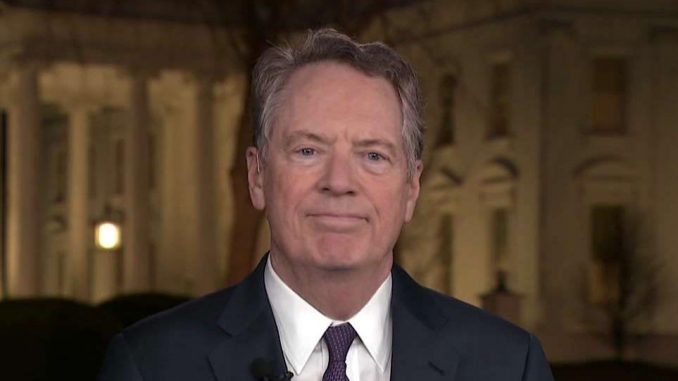
U.S. Trade Representative Robert Lighthizer and Chinese Vice Premier Liu He are set to sign a historic preliminary trade deal Wednesday, delivering on a cornerstone commitment of President Trump’s 2016 campaign.
The agreement, the first piece of a broader pact that Trump says may have as many as three phases, is said to include commitments from Beijing to purchase $200 billion of U.S. products over the next two years, halt intellectual property theft and refrain from currency manipulation. In return, the U.S. will reduce tariffs on some products made in China, but keep duties the White House has imposed on $375 billion worth of merchandise.
“It’s a really, really good deal for the United States, and it will work if reformers in China want it to work,” Lighthizer told FOX Business’ Lou Dobbs on Monday evening. “And if that happens, great. If it doesn’t happen, it’s fully enforceable.”
Already, the U.S. has updated its Foreign Exchange Report to indicate that it no longer considers China a currency manipulator, a move Beijing had requested before the signing took place.
Senate Minority Leader Chuck Schumer, whose party is fighting to oust Trump from the White House in elections this fall, slammed the agreement based on reports preceding the full text, which hasn’t yet been shared. Its terms appear likely to “result in very little progress in reforming China’s rapacious trade behaviors” and could “send a signal to Chinese regulators that the U.S. can be steamrolled,” the New York Democrat wrote in a letter to the president.
Investors and business leaders, meanwhile, remain hopeful the agreement will ease a nearly two-year trade war between the world’s largest economies, which has driven up supply costs and inhibited growth in both countries.
China’s economic expansion slowed to 6 percent in the third quarter, the weakest since recordkeeping began in 1993, amid uncertainty related to the trade war. Ahead of the phase one agreement, economists at Bank of America predicted it would slow to 5.6 percent this year.
Meanwhile, the U.S. economy grew at a 2.1 percent pace in the third quarter, slowing from 3.1 percent at the beginning of 2019.
The signing of the partial deal “would clearly be a positive for the near-term outlook, by removing the threat of consumer tariffs, reducing uncertainty and providing a small boost to exports,” Andrew Hunter, senior U.S. economist at London-based Capital Economics, wrote last month after the deal was announced.
Trump has said phase two talks will begin immediately.
“We’ll start right away negotiating phase two,” the president said Thursday at the White House. “I think I might want to wait to finish it till after the election because by doing that I think we can actually make a little bit better deal, maybe a lot better deal.”
*story by Fox Business